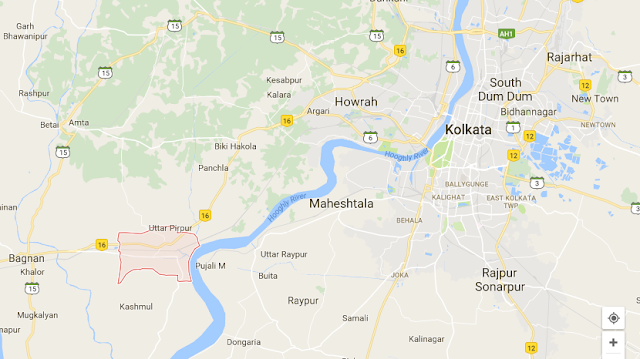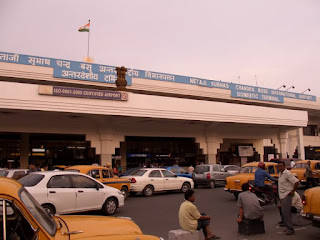 |
| Calcutta in the 80s is now Kolkata, but Howrah and Dum Dum are the same. Uluberia you can see in the red line. |
When I was 19, I decided to travel to India. God was involved and my church and my father,
but I was the one determined to go. I
was planning on going to a Christian school in India, so I filled out the long
application in plenty of time and sent it off, waiting to hear if I was
accepted. In the meantime, I got my
passport and shots, arranged for the finances and waited. And waited.
It was 1985 and international mail to third world countries was just
terrible. A week before the school was
supposed to start, I was still waiting.
I told my parents that I guess I wasn't going to hear back, so I wasn't
going to go. I was severely
disappointed. I was ready, really ready
to go, but nothing.
You saw this coming.
Four days before the school was supposed to start, I received an
acceptance letter on onion skin paper. I
paced like I've never paced before in my life.
I'm pretty sure I burned a hole in the carpet. And I decided to go. I packed quickly... (should I take a camera? Absolutely.
Should I take my electric typewriter?
Of course! What about my boom box?
Oh yeah... with a set of cassettes.) Before I left I got all my money in
traveler's cheques and sent a wire to the school in Calcutta when my flight was
scheduled to arrive. I climbed aboard the plane and I was quite nervous (my
first plane trip), but the take off was fun.
Like a rollercoaster. (Landings still bother me.) Then I was off to San
Francisco.
I had to go to SF to get my visa and that was where the
Indian Embassy was on the west coast of the U.S. I landed in the SF airport, got a taxi who
drove me in circles for a while before dropping me off at the embassy. I marched in at 9 in the morning, went to the
counter and said I wanted a visa. He
said, "Fine, no problem. Just leave
your passport with us and we'll get you a visa in a week." No, you don't understand, I explained. I need one today. I'm supposed to go to school in just a few
days. "I'm sorry," he politely
explained, "but our policy is that it takes a week." "Why?" I said in my best pushy
American accent (my normal one).
"You are here. The stamp is
here. I'm sure you can work this
out." He said firmly, "No. It
takes a week." I thought for a
moment and said, "Okay. I
understand. Well, the next place I go to
is India. So I'll just sit here in front
of you until my visa is ready."
And I sat there all day.
I had snacks in my suitcase (I had no where to put it), so I was
good. At five o clock the embassy was
closing. And they handed me my passport
back with the visa in it, glad to be rid of me, I suppose.
Back on a plane, with a stop at Korea and another in
Thailand. Overseas plane rides are quite long and quite dull. Nowadays we have computers and hand held
devices, but then, you read a book. I brought a collection of short stories by
Saki. You might be able to read,
assuming you could focus on the book amidst the babies crying, people talking
around you and (God forbid!) to you. The
food was delicious. Really. American flights are awful for food. But on Thai Air, it was wonderful, and
everyone was so polite and... well, it was my first flight. If it weren't for the length, I would have
loved it.
Finally, I arrived in Thailand, ready to get my next flight
to Calcutta. Unfortunately, it was
monsoon season, so the Dum Dum airport (yes, that's the name of the Calcutta
airport) was washed out. So the airline
would put me up in a hotel for the night.
So my first night in Asia... my first night out of North America... was
in a five star hotel with a wonderful breakfast, all paid for by the
airline. Things have really changed
since 1985.
The next day, caught the flight to the Dum Dum airport (how
can I not say that airport name as often as possible) and arrived promptly in
India. As I walked off the plane, down the runway to the airport, the humidity
is what really struck me. In the
face. Like a hard slap. I am from
Southern California, so I'm used to desert heat, but this humidity is something
I'd never experienced. Completely oppressive. I was unfazed, though, I had stuff to do.
I proudly showed immigration my brand new visa, and then
went to customs. Customs was confused as
to what to do with my electronics. They
weren't sure what the electric typewriter was until I took off the cover. They weren't impressed at all. Instead, they explained in a strong Indian
accent-- well, it wasn't strong at all, as I was later to find out, his English
was excellent and quite understandable-- that if I was interested in taking
these items out of India, I had to make sure that I had this receipt he was
going to give me, otherwise I would have to pay a tariff on them, which was
quite expensive. I made sure to place
that receipt carefully in my suitcase, next to the electronics, to make sure I
had it when I left the country six months later.
Free of the lines, I looked for anyone holding a sign or
looking for a blonde-haired-blue-eyed American with a funny looking hat. I looked and waited and no one was
there. I was disappointed. I really thought that someone would meet
me. After all, I wired them almost a
week ago. And I'm sure that they called
the airport to find out the flight was delayed.
But this was the day before the school was about to start. Perhaps they were too busy. So I went to the taxi station.
 |
| A lot more taxis now than there used to be. |
"Hello!" I called out to all the drivers in line,
as if I were an older woman looking for a servant. "Excuse me? Could any of you take me to Uluberia?" One driver had enough wherewithall to quickly
say, "Yes, yes, I'll take you" while the others were trying to
understand what I said.
"Where?" I repeated,
"Uluberia" I showed him the
school address and he took it to the other taxi drivers who gathered around
discussing where this insane American wanted to be driven to. One man seemed to know just where to go, so
he explained it to my driver. "Okay," my driver says and motions me
to get in the taxi. I put my suitcase on
my lap and we headed off.
Meantime, the school I was attending was in an uproar. They had just received my wire, about the
time I had climbed into that taxi. The
school was run by an American, a woman from Darjeeling and a Filipino. Of course, they had no phone they were in a
village about fifteen miles away from the city, and it would be an all day trip
on the train for them to get to Calcutta and back. But one of them agreed to go
the the city and look in all the main hotels to see where I was. They had a prayer meeting where they pleaded
with God for my safety.
I really appreciate those prayers because I realized that
this wasn't just a trip from downtown to the suburbs. After we got out of the city, there was only
one lane per road. So if there was any
cross traffic, like, say, a bus, we had to get off the road and wait for them
to pass. It was soon dark and we were
still driving. After two hours I
wondered how long this was going to really take. And I was in a desperate state, in need of a
bathroom. Every time a bus passed us,
especially when it was dark and there wasn't enough room on the side of the
road to pull off, I found that I almost relieved myself there. Frankly, there didn't seem to be any rules
for driving on these roads at all. But
they still didn't drive very quickly, it seemed to me.
Another hour later, they slowed down, rolled down their
window, and asked a man "Uluberia?"
He said something, but they seemed satisfied. They then asked him about the "Mission
House" where the school was. He
shook his head no. They asked three more
people until they finally found someone who knew. They rolled up at a gate with a sign on one
side of it, "Uluberia Mission House".
I gratefully got out of the back of the car with my suitcase and
stretched my legs. The gate was closed
and it took five minutes for my driver to explain what was going on to the
guard at the gate. I could imagine the
conversation didn't make me look too good.
The gate eventually opened and a white face came out to meet
me. "Are you Steve
Kimes?" I said that I was. "I can't believe it! We were just praying for you! Did you take a taxi here?" Yes, I replied, from the airport. "Really?
I don't think anyone has taken a taxi from Calcutta to Uluberia before!
Why didn't you take the train?" The
answer to that was, of course, I had no idea about trains being a thing in
India.
"I'm sorry to interrupt you," I said breathlessly,
"But I could really use a bathroom."
"Of course" the white man said and led me to his quarters and
indicated a door. On the other side of
the door there was not a bathroom. There
was, however, a hole with bricks on either side of it. I stared at it for a while. Not sure what to do, but too desperate
to think about it too long, I sat down
on the hole and relieved myself.
Feeling much better, I went to the main room and told him,
"Did you know there's no toilet paper in there?"

